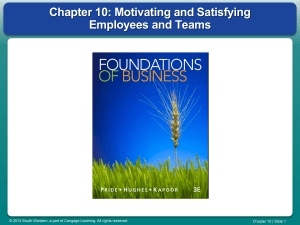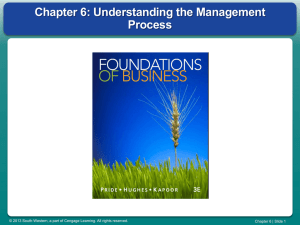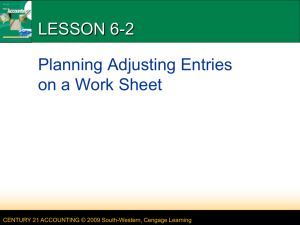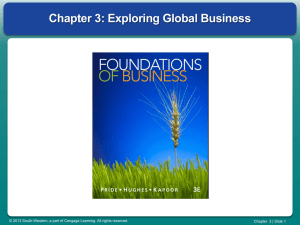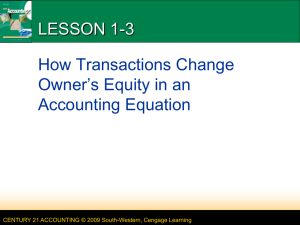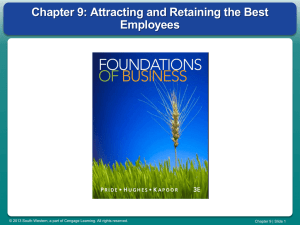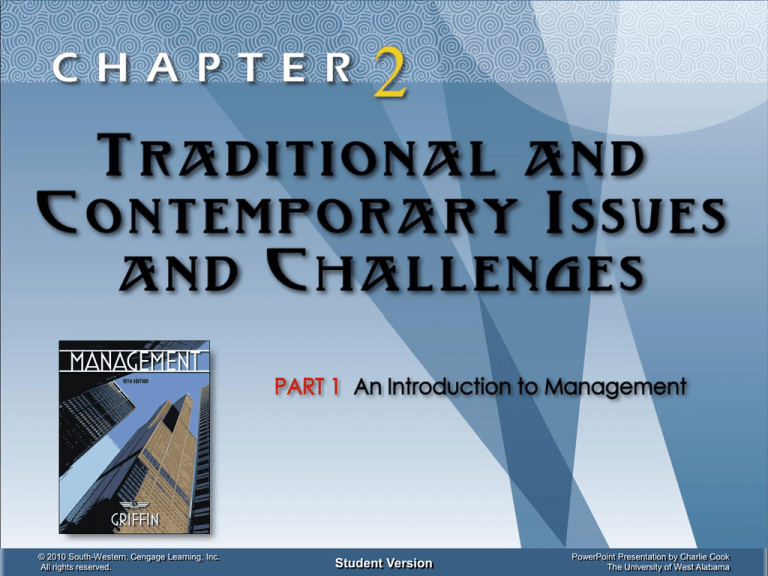
© 2010 South-Western, Cengage Learning, Inc.
All rights reserved.
Student Version
PowerPoint Presentation by Charlie Cook
The University of West Alabama
The Importance of Theory and History
• Why Use Theories?
Theories provide conceptual frameworks for
organizing knowledge and blueprints for actions.
Management theories are grounded in reality.
Managers develop their own theories about how they
should run their organizations.
• Why Study History?
Understanding history aids managers in the
development of management practices and in
avoiding the past mistakes of others.
© 2010 South-Western, Cengage Learning, Inc. All rights reserved.
2–2
Classical Management Perspective
• Consists of two different viewpoints:
Scientific Management
Concerned with improving the performance
of individual workers (i.e., efficiency).
Grew out of the industrial revolution’s labor
shortage at the beginning of the twentieth
century.
Administrative Management
A theory that focuses on managing
the total organization.
© 2010 South-Western, Cengage Learning, Inc. All rights reserved.
2–3
Behavioral Management Perspective
• Behavioral Management
Emphasized individual attitudes and behaviors, and
group processes.
Recognized the importance of behavioral processes
in the workplace.
• Hugo Münsterberg (1863–1916)
Is considered the father of industrial psychology.
Wrote “ Psychology and Industrial Efficiency.”
© 2010 South-Western, Cengage Learning, Inc. All rights reserved.
2–4
Behavioral Management Evolves
• The Human Relations Movement
Grew out of the Hawthorne studies.
Proposed that workers respond primarily to the social
context of work, including social conditioning, group
norms, and interpersonal dynamics.
Assumed that the manager’s concern for workers
would lead to increased worker satisfaction and
improved worker performance.
© 2010 South-Western, Cengage Learning, Inc. All rights reserved.
2–5
Emergence of Organizational Behavior
• Focuses on behavioral perspectives of
management.
Draws on psychology, sociology, anthropology,
economics, and medicine.
• Important organizational behavior topics:
Job satisfaction and job stress
Motivation and leadership
Group dynamics and organizational politics
Interpersonal conflict
The design of organizations
© 2010 South-Western, Cengage Learning, Inc. All rights reserved.
2–6
Quantitative Management Perspective
• Quantitative Management Uses
Helped World War II Allied forces manage logistical problems.
Focuses on decision making, economic effectiveness,
mathematical models, and the use of computers to solve
quantitative problems.
• Management Science
Focuses on the development of representative mathematical
models to assist with decisions.
• Operations Management
The practical application of management science to efficiently
manage the production and distribution of products and services.
© 2010 South-Western, Cengage Learning, Inc. All rights reserved.
2–7
Integrating Perspectives for Managers
• Systems Perspective
A system is an interrelated set of elements functioning as a
whole.
• Open system
An organization that interacts with its external environment.
• Closed system
An organization that does not interact with its environment.
• Subsystems
The importance of subsystems is due to their interdependence
on each other within the organization.
© 2010 South-Western, Cengage Learning, Inc. All rights reserved.
2–8
Management Perspectives Compared
• Universal Perspective
Includes the classical, behavioral, and quantitative
approaches.
Attempted to identify the “one best way” to manage
organizations.
• Contingency Perspective
Suggests that each organization is unique.
Appropriate managerial behavior for managing an
organization depends (is contingent) on the current
situation in the organization.
© 2010 South-Western, Cengage Learning, Inc. All rights reserved.
2–9
Modern Management Today
• An Integrative Framework
Is a complementary way of thinking about theories of
management.
Involves recognition of current system and subsystem
interdependencies, environmental influences, and the
situational nature of management.
© 2010 South-Western, Cengage Learning, Inc. All rights reserved.
2–10
Key Terms
• theory
• classical management
perspective
• scientific management
• soldiering
• administrative
management
• behavioral management
perspective
• Theory X and Theory Y
• human relations movement
© 2010 South-Western, Cengage Learning, Inc. All rights reserved.
• organizational behavior
• quantitative management
perspective
• management science
• operations management
• system
• closed system
• subsystem
• synergy
• entropy
• contingency perspective
2–11

